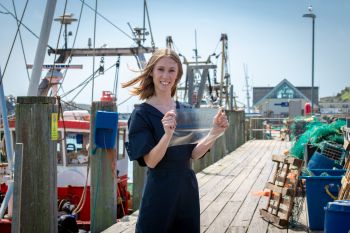Genius sustainable plastic idea using fish waste wins UK Dyson Award for Sussex graduate
By:
Last updated: Friday, 20 September 2019

A University of Sussex graduate’s innovative solution to the plastic plague destroying the Earth’s oceans has been named a winner in one of the world’s most prestigious design awards.
Product design graduate Lucy Hughes has been named this year’s UK national James Dyson Award winner and will receive £2,000 to help her develop her idea.
The 23-year-old’s daring final year product aimed to solve the problem of both single-use plastics and inefficient waste streams by harnessing fish offcuts to create a unique bioplastic alternative called MarinaTex.
Lucy now goes forward to the international final in November and stands the chance of winning the grand prize of £30,000.
She said: “Plastic is an amazing material, and as a result, we have become too reliant on it as designers and engineers. It makes no sense to me that we’re using plastic, an incredibly durable material, for products that have a life-cycle of less than a day.
“For me, MarinaTex represents a commitment to material innovation and selection by incorporating sustainable, local and circular values into design. As creators, we should not limit ourselves to designing to just form and function, but rather form, function and footprint.”
MarinaTex, made of organic fish waste ordinarily destined for landfill or incineration and locally sourced red algae, is a translucent and flexible sheet material that could be used in a wide range of single-use packaging including sandwich containers and tissue boxes.
Initial testing suggests that it is stronger, safer and much more sustainable than traditional oil-based plastic.
The material is relatively resource-light, requiring little energy and temperatures under 100 degrees to produce. It biodegrades after four to six weeks, is suitable for home composting and does not leach toxins, removing the need for its own national waste management infrastructure.
According to Lucy, one Atlantic cod could generate as much organic waste as is needed for making 1,400 bags of MarinaTex.
Lucy aims to commercialise her invention sustainably, using her award money for further research into how MarinaTex can become a global answer to the abundance of plastic waste while still harnessing local solutions.
Diane Simpson-Little, senior teaching fellow at the University of Sussex, said: "This is great recognition for a brilliant idea. All of us in the product design team wish Lucy well for the big international prize and hope that the right support now comes forward to ensure this innovative idea fulfils its potential and appears on supermarket shelves in the very near future."
The James Dyson Award is a hugely sought after prize in the design and engineering world.
It is open to any university level student of product design, industrial design or engineering, or graduate within four years of graduation, who is studying or studied in Australia, Austria, Belgium, Canada, China, France, Germany, Hong Kong, India, Italy, Ireland, Japan, Malaysia, Mexico, the Netherlands, New Zealand, the Philippines, Russia, Singapore, Spain, South Korea, Switzerland, Sweden, Taiwan, the UAE, the UK and the USA.
The next stage of the awards will see a worldwide Top 20 announced from more than 1,000 applicants on October 17.
The final winner will be chosen by Sir James Dyson and announced on November 14.

